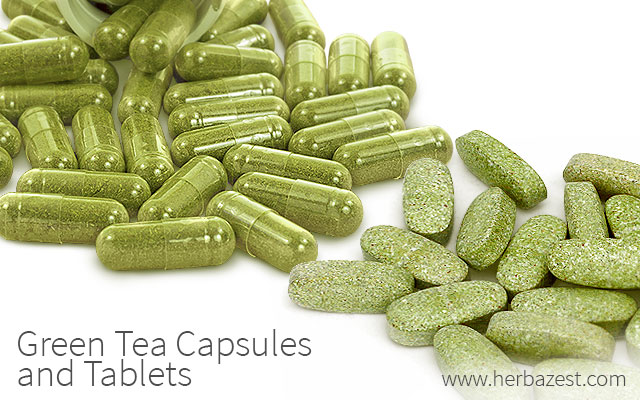Green tea capsules and tablets have seen a rise in their popularity among supplement enthusiasts in the recent years. They are made with green tea extract, which is very potent and packed with health-promoting compounds. As research has shown, taking green tea supplements provides the same benefits as drinking green tea.
Benefits of Green Tea Capsules
Green tea concentrate forms like tablets and capsules are taken as a supplement for a variety of conditions, such as diabetes and hypertension. Their benefits are attributed to the active compounds present in green tea, which include polyphenols, L-theanine, and caffeine, as well as vitamins B, C, and E along with a handful of minerals, such as magnesium and potassium.
Catechins, particularly epigallocatechin gallate (EGCG), are the most abundant form of polyphenols in green tea and are responsible for most of its medicinal effects. They have been shown to play a role in boosting metabolism, promoting weight loss, reducing cholesterol, lowering blood pressure, and preventing degenerative diseases. On the other hand, L-theanine has been shown to reduce stress, as well as to promote alertness and improve cognitive function when caffeine is present.
Although green tea capsules provide many benefits, they should be used with caution as various supplements containing green teat extract, for example those for weight loss, have been linked to liver toxicity and might cause headaches and irritability.
Where to Buy Green Tea Capsules and Tablets
Finding green tea capsules and tablets is easy as they are offered in many health stores and online. However, as with all supplements, it is crucial to read the labels carefully and verify the manufacturer. There are few important things to consider when selecting green tea capsules:
The green tea extract in the capsules should preferably be made from whole, fresh tea leaves, because they contain the highest amount of polyphenols. But some companies fill their capsules with leftover parts of broken leaves and stems, which are not nearly as potent as the extract.
The producers of good quality green tea tablets and capsules specify the percentage of polyphenols in their supplements, often adding the amount of catechins as well.
The recommended daily dose of polyphenols is 240-329 mg.
Green tea caffeine content should also be listed on the label, because higher intakes of caffeine might cause palpitations, muscle tremors, and gastrointestinal irritation. The safe daily intake of caffeine is up to 400 mg, so additional coffee or tea drinks should be taken into account when consuming green tea supplements.
Green tea capsules are most often made with gelatin, but plant-based versions are also available. They should be free of any preservatives and unnecessary additives.
Green tea tablets, on the other hand, are a blend of active ingredients and excipients compressed into a solid form, usually coated to allow for smooth ingestion and proper absorption. Though rare, it is possible to have an allergic reaction to the bonding agents, therefore lactose free and gluten free tablets are the safest options.
Manufacturers of green tea tablets and capsules often use the term "standardized" to describe the composition of their ingredients. This ensures that they have the same content, and their composition is strictly controlled.
Sources
- Chemistry and Applications of Green Tea, pp. 13-18
- Chinese Medicine, Beneficial effects of green tea: A literature review, 2010
- National Institutes of Health, Green tea composition, consumption, and polyphenol chemistry
- Journal of Agricultural and Food Chemistry, Catechin and Caffeine Content of Green Tea Dietary Supplements and Correlation with Antioxidant Capacity, 2006




